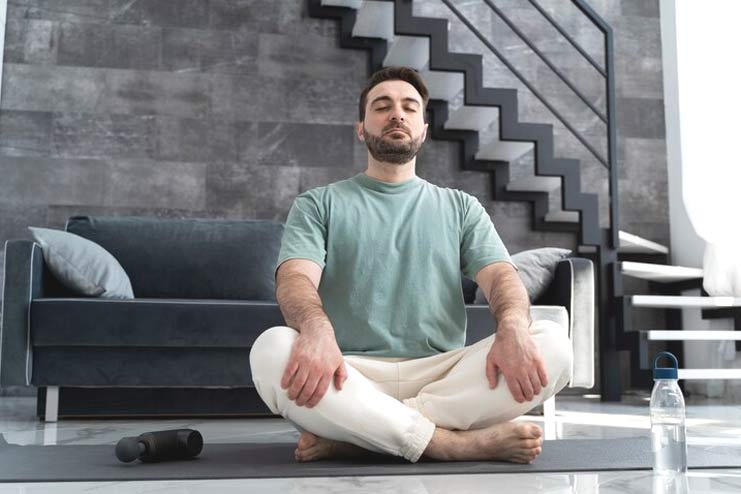Affiliate Disclaimer
Some links in this article are affiliate links. We may earn a small commission if you make a purchase through these links, at no extra cost to you. We only recommend products we find useful to our readersStress is becoming a prevalent element woven into men’s lives in our fast-paced society. Developing a shared awareness of stress’s effects on mental health begins with acknowledging how commonplace it is. This article explores helpful advice men can use to manage and reduce stress properly.
By acknowledging the everyday experience of stress, we can open up positive dialogue and offer insightful commentary that appeals to men in all spheres of life. Come along on a journey to improved well-being and resilience as we examine doable tactics for overcoming the obstacles of contemporary life.
Tip 1: Prioritize Physical Activity


Regular physical activity is a potent remedy for the stressors of contemporary life. Exercise is essential for stress reduction in addition to improving physical health. Exercise causes the body’s natural mood enhancers, endorphins, to be released, which elevates mood and fosters calmness. Improving mental clarity and lowering tension, including exercise in everyday routines, can considerably reduce stress.
Think about smoothly integrating physical activity into your everyday routine to make it more accessible. Easy but powerful ideas include:
- Using the stairs instead of the elevator.
- Going for quick walks during breaks.
- Incorporating at-home workouts into your bedtime or morning routines.
These minor changes have a significant impact on your life by encouraging a steady release of tension throughout the day. Investigating various exercise modalities also guarantees sustainability and variation. Finding an activity that fits your interests and lifestyle, whether team sports, cycling, yoga, or jogging, increases the likelihood of long-term commitment. Even small amounts of daily activity are a significant source of stress alleviation.
Making physical activity a priority is an investment in your health and a proactive approach to stress management. People who understand the value of physical activity and integrate it into their daily routines might develop resilience and strengthen their defenses against the adverse effects of stress.
Tip 2: Embrace Mindfulness and Relaxation Techniques


Adopting mindfulness and relaxation practices is a revolutionary and approachable strategy for stress management. The advantages of adopting these routines go beyond the brief relief they bring, significantly influencing general well-being. Present-moment awareness, the hallmark of mindfulness, encourages emotional equilibrium, mental clarity, and increased self-awareness.
Unlocking the body’s innate relaxation response requires relaxation techniques like deep breathing exercises or meditation. Inducing a sense of tranquility can be done instantaneously by taking deliberate, deep breaths that offset the physiological consequences of stress. Whether it is self-directed or led, meditation promotes a mental shift toward tranquility and cultivates a sense of peace despite the stresses of daily life.
It is possible to skillfully fit brief periods of mindfulness throughout the day into hectic schedules. Taking a few minutes to perform a quick body scan, pay attention to your breathing, or observe your surroundings without passing judgment can create spots of calm in an otherwise busy day. These easy methods act as anchors, bringing people back to the present and providing a break from the stresses of everyday life.
People who practice mindfulness and relaxation provide themselves with essential tools for managing stress. Including these rituals in everyday life builds resilience and offers a haven of peace in the face of life’s inevitable difficulties. To promote a long-lasting sense of well-being, the path to stress reduction becomes more than merely a destination—instead, it becomes an intentional investigation of the present.
Tip 3: Foster Healthy Connections


Building good relationships becomes a crucial thread in the complex tapestry of stress management, tying emotional well-being into the fabric of our existence. Since humans are social animals by nature, the strength of our relationships with others significantly impacts our capacity to handle stress. A strong sense of social support, emotional stability, and perseverance in the face of adversity are all influenced by solid social bonds.
Acknowledging the importance of social ties, friendships, families, and romantic relationships must be fostered. Frequent communication, whether via in-person meetings, phone conversations, or online forums, fortifies the ties that constitute our social support systems. Sharing ideas, feelings, and experiences allows one to express oneself and lessens the emotional toll that stress can take.
Whether it’s a simple lunch, a stroll, or a shared interest, spending time with loved ones strengthens the bonds and creates a sense of camaraderie. These connections are further strengthened by actively listening to others and demonstrating empathy, which lays the groundwork for understanding and trust.
In relationships, it’s also critical to establish limits and give self-care priority. Being transparent about individual needs and expectations ensures a healthy balance between personal space and connection.
People who intentionally cultivate positive relationships improve their emotional health and build a strong support network to withstand stressful situations. Embracing genuine relationships becomes a source of joy, resilience, and strength in the complex dance of life.
Tip 4: Establish Work-Life Balance


Work-life balance is more important than ever in a world where work often invades personal life. Work-related stress affects mental health, relationships, and life satisfaction. Balance between work and life is essential to a healthy and happy life.
Practical, balanced lifestyle solutions are needed to manage work-related stress. Separating work and personal time is crucial. Set aside time for work, recreation, family, and self-care. Separating work and home can reinforce these boundaries and mark the shift from professional to personal roles.
Prioritizing and distributing duties lets you avoid overwork. Time-management methods like the Pomodoro method promote efficiency without sacrificing well-being by encouraging focused work intervals followed by quick breaks.
Open communication with bosses and coworkers about realistic expectations and probable challenges can also help create a supportive workplace. A work-life balance culture helps individuals and boosts workplace satisfaction and productivity.
A healthy work-life balance protects against work-related stress, leading to a more rewarding and sustainable life. Finding this balance is an investment in personal well-being and a key to long-term success and enjoyment.
Tip 5: Prioritize Sleep and Recovery


The importance of sleep on well-being is often underestimated in stress management. The complex relationship between sleep and stress reduction emphasizes the need for rest for mental and physical health. Science shows that sleep regulates stress hormones, improves cognition, and boosts emotional resilience.
Consider practical ways to improve sleep quality and create a relaxing nighttime routine. Set a sleep routine for seven to nine hours per night. Regularity synchronizes the body’s internal clock, enhancing sleep-wake cycles for health.
Relaxing pre-sleep routines tell the body to unwind. It could include reading, moderate stretches, or mindfulness. Avoiding electronic gadgets before bedtime and providing a pleasant sleep environment with dim lighting and a cool room temperature aids restful sleep.
Careful nutrition affects sleep quality. Limiting caffeine before bedtime and eating a light, balanced dinner helps you sleep. Sleep and recovery are essential to stress management, not just a luxury. By investing in sleep, people gain the resilience to meet life’s difficulties with clarity, focus, and a rested spirit.
Creating a Personalized Stress-Busting Plan


Given that every person’s path to stress alleviation is different, it’s critical to provide readers with the tools they need to pinpoint their stressors and preferences. To identify the causes of stress in various facets of life, such as relationships, employment, or personal aspirations, start by promoting self-reflection. Recognizing various pressures allows people to adjust their strategies to deal with them effectively.
Expanding on the advice given, assist readers in creating a customized stress-reduction strategy that fits their requirements and way of life. It is crucial to combine several tactics to form an all-encompassing strategy. A comprehensive stress-reduction plan, for example, can include regular exercise, practicing mindfulness, building strong relationships, creating a work-life balance, and prioritizing getting enough sleep.
Emphasize the need to be patient and consistent when implementing these changes. Over time, minor, long-lasting changes to everyday routines can produce significant gains. Urge readers to monitor their development and modify their customized strategy to reflect changing conditions.
The search for stress alleviation is ultimately a reflective process. A stress-busting plan tailored to each person’s preferences and stressors can help them take proactive measures toward improved resilience, well-being, and a more satisfying existence.
Recognizing Signs of Chronic Stress


Given that chronic stress can have a substantial adverse influence on one’s physical and mental health, it is crucial to recognize the subtle indicators of this condition in the fast-paced rhythm of modern life. Changes in sleep patterns and difficulty concentrating, together with persistent sensations of anxiety, anger, or weariness, could be early indicators of chronic stress. It is essential to realize that these indications can show themselves in various ways and impact numerous facets of life, including relationships, employment, and general quality of life.
Being proactive with your self-care starts with identifying the symptoms of chronic stress. By being aware of these indicators, people can take early action and apply stress-reduction techniques to stop the situation from worsening.
Recognizing that getting expert assistance is a show of strength rather than weakness is equally crucial. Speaking with a mental health expert is a wise and helpful move if stress overwhelms you and starts to impact your day-to-day functioning negatively. Counselors and therapists can offer insightful advice, coping skills, and a haven for anyone navigating the challenges of long-term stress.
Making mental health a priority is an investment in one’s entire well-being. Individuals may take charge of their mental and emotional well-being by identifying the warning signs of chronic stress, which builds resilience and paves the way for long-term stress management.
Small Changes, Big Impact


Recognizing the transforming impact of minor, deliberate lifestyle changes in pursuing stress relief is essential. Despite the perception that drastic measures are required, the cumulative effect of regular, consistent behaviors tells a different story. By adopting this viewpoint, people can set out on a path of sustainable and achievable changes that will lead to lower stress levels.
Little adjustments are beautiful since they are simple to implement and blend into daily routines. These seemingly small actions, like prioritizing self-care, taking brief mindful breaks throughout the day, or dedicating a limited period for deep breathing exercises, can significantly impact lowering stress levels.
Promote a cautious strategy and stress that consistency is more important than intensity. The objective is to develop long-lasting habits rather than drastically changing one’s life quickly. People who sustainably embrace stress-reduction techniques enhance their chances of success in the long run and lay the groundwork for better general well-being.
Little adjustments set the stage for long-lasting improvement in stress management. People can learn the significant benefits of regular self-care through these small changes, opening the door to a more robust and satisfying existence.
Conclusion
The top 5 stress-busting ideas for men include doable tactics for leading a happier and more balanced life: prioritize physical activity, embrace mindfulness, foster healthy connections, establish work-life balance, and prioritize sleep. Together, these pillars offer a holistic approach to stress management that acknowledges the reality of stress and offers doable strategies for building resilience.
Readers are advised to prioritize their mental health by quickly incorporating these suggestions into their daily lives as they embark on their road towards well-being. Men may strengthen themselves against life’s challenges, promote long-lasting enjoyment, and maintain well-being by making tiny, steady improvements.
Other Recommended Articles
Reference
https://journals.lww.com/acsm-healthfitness/fulltext/2013/05000/stress_relief__the_role_of_exercise_in_stress.6.aspx
https://www.health.harvard.edu/staying-healthy/exercising-to-relax#:~:text=The%20mental%20benefits%20of%20aerobic,natural%20painkillers%20and%20mood%20elevators.
https://www.mayoclinic.org/healthy-lifestyle/stress-management/in-depth/exercise-and-stress/art-20044469#:~:text=Exercise%20increases%20your%20overall%20health,%2Dgood%20neurotransmitters%2C%20called%20endorphins.
https://www.ncbi.nlm.nih.gov/pmc/articles/PMC3336928/#:~:text=Studies%20have%20shown%20significant%20decrease,skin%20disorders%2C%20after%20MBSR%20therapy.
https://www.apa.org/monitor/2012/07-08/ce-corner
https://www.helpguide.org/harvard/benefits-of-mindfulness.htm
https://www.cdc.gov/emotional-wellbeing/social-connectedness/affect-health.htm#:~:text=Our%20relationships%20with%20family%2C%20friends,mental%20and%20physical%20health%20outcomes.
https://eoss.asu.edu/devils4devils/resources/social-emotional-wellbeing#:~:text=Social%20and%20emotional%20well%2Dbeing,the%20likelihood%20of%20misusing%20substances.
https://www.hhs.gov/sites/default/files/sg-social-connection-individuals.pdf
https://www.apa.org/topics/healthy-workplaces/work-stress#:~:text=Effects%20of%20uncontrolled%20stress&text=Chronic%20stress%20can%20result%20in,%2C%20obesity%2C%20and%20heart%20disease.
https://www.betterhealth.vic.gov.au/health/healthyliving/work-related-stress
https://www.osha.gov/workplace-stress
https://www.bcm.edu/news/how-stress-can-affect-your-sleep#:~:text=%E2%80%9CHigh%20levels%20of%20stress%20impair,disrupts%20sleep%2C%E2%80%9D%20Wilson%20explained.
https://www.ncbi.nlm.nih.gov/pmc/articles/PMC6984036/
https://sleepopolis.com/education/how-sleep-reduces-stress/
https://www.healthline.com/health/stress-causes#how-to-cope
https://www.cdc.gov/violenceprevention/about/copingwith-stresstips.html
https://www.helpguide.org/articles/stress/stress-management.htm
https://www.communityaccessnetwork.org/how-to-recognize-the-signs-of-stress/#:~:text=It’s%20important%20to%20recognize%20when,far%20more%20than%20ignoring%20it.
https://www.yalemedicine.org/conditions/stress-disorder
https://www.medicalnewstoday.com/articles/323324
https://www.ncbi.nlm.nih.gov/pmc/articles/PMC2723327/#:~:text=Persons%20with%20a%20healthy%20lifestyle,to%20alleviation%20of%20subjective%20stress.
https://health.mil/News/Articles/2023/06/22/Lifestyle-Changes-Lead-to-Longer-Healthier-Life
https://www.cdc.gov/violenceprevention/about/copingwith-stresstips.html






























